Consider chemotherapy to be the strategic queen in the complex game of chess against prostate cancer— powerful, dynamic, and making game-changing moves to secure victory.
When it comes to the treatment of prostate cancer, chemotherapy is a topic that frequently comes up. Prostate cancer is a big health problem for men who live all over the world.
In this article, we will go into the specifics of chemotherapy for prostate cancer, discussing its function, the advantages it offers, and the factors that patients should take into mind.
The path that we are about to start on is to gain an understanding of the role that chemotherapy plays in the treatment landscape of prostate cancer.
In a recent real-world population-based research study, the use of chemotherapy in patients with metastatic prostate cancer was linked to improved overall survival. Nevertheless, the extent of the survival benefit observed in this contemporary setting did not align with the outcomes reported in phase 3 clinical trials, according to data from the National Library of Medicine.
Before we delve into chemotherapy, let’s take a moment to understand the basics of prostate cancer.
The Basics of Prostate Cancer
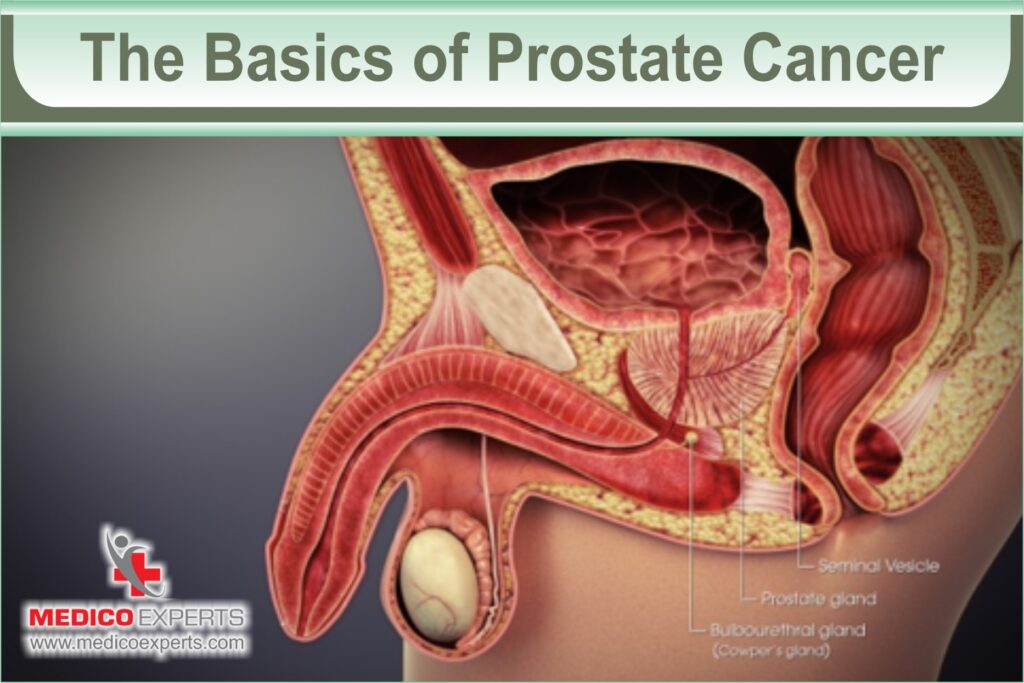
The prostate, a small walnut-shaped gland in men, is a crucial part of the reproductive system. The prostate gland develops prostate cancer when cells grow uncontrollably.
While various treatment options exist, chemotherapy is often considered in specific situations.
What is Chemotherapy?
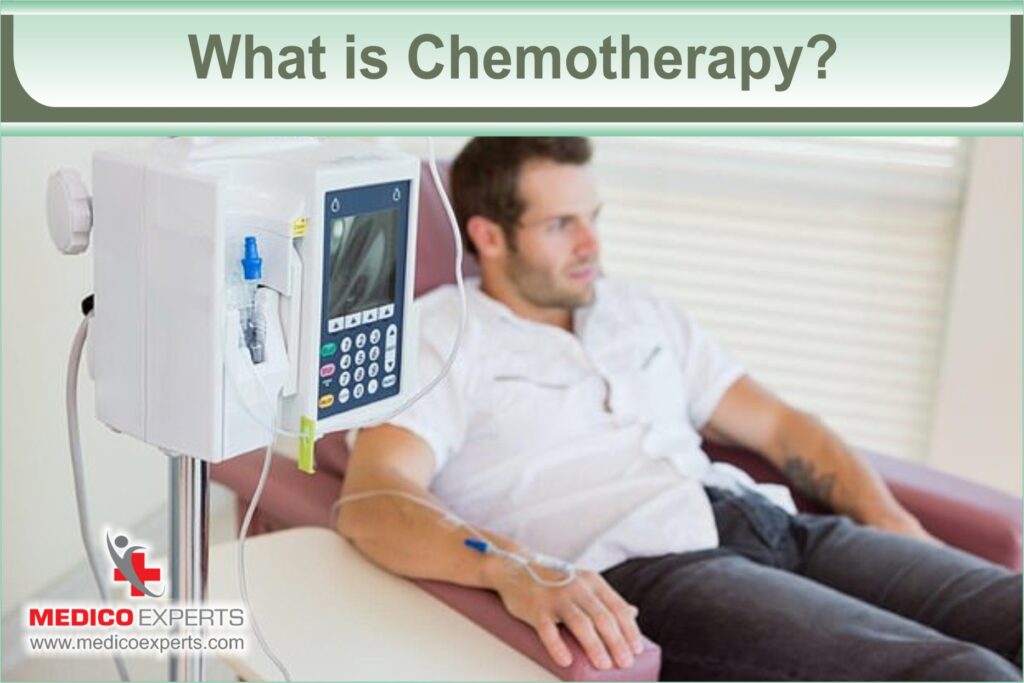
The goal of chemotherapy is to destroy cancer cells through the use of drugs. Unlike surgery or radiation therapy, which targets specific areas, chemotherapy circulates throughout the body, making it a systemic treatment.
This characteristic makes chemotherapy a valuable option for cancers that have spread beyond the prostate.
When is Chemotherapy Used for Prostate Cancer?
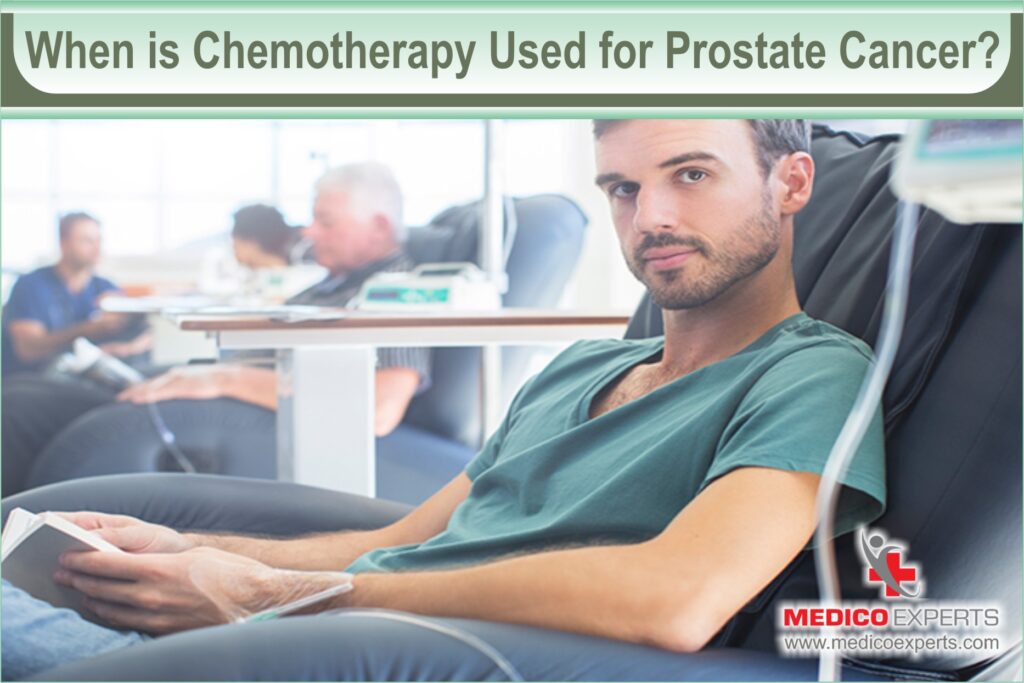
Chemotherapy is typically not the first line of treatment for prostate cancer. It is often considered when the cancer has metastasized, meaning it has spread to other parts of the body.
Additionally, chemotherapy might be recommended if other treatments, such as hormone therapy, have not been effective.
What does the chemotherapy process for prostate cancer involve?
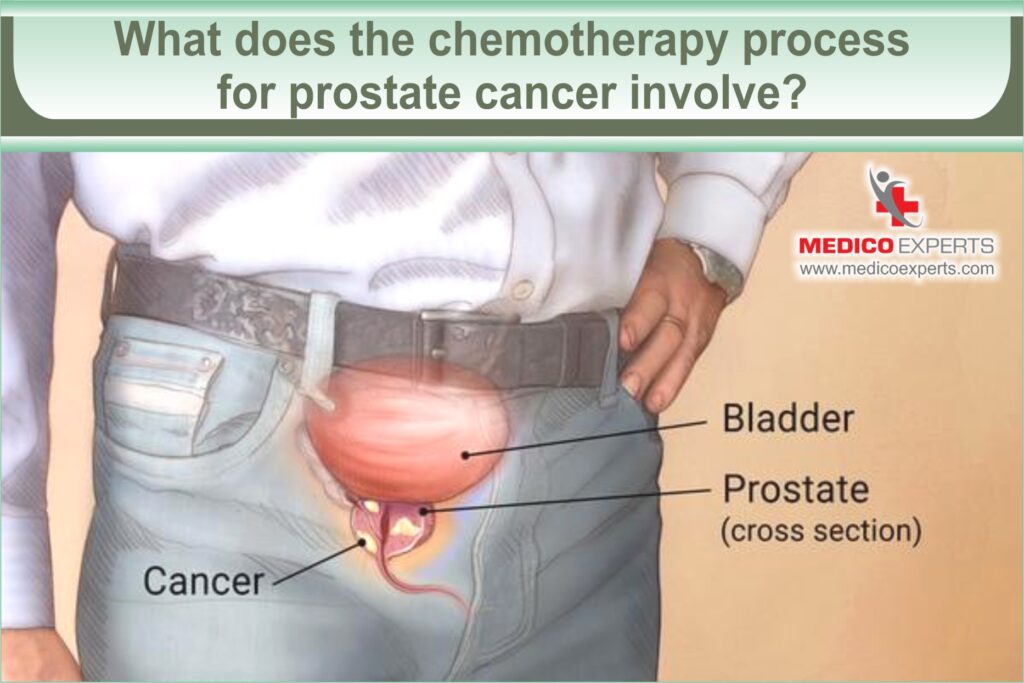
The chemotherapy process involves the use of drugs to treat cancer.
Here’s a simple breakdown:
Drug Administration:
Chemotherapy drugs are given to the patient either through an IV, orally, or via injections.
The choice depends on the specific drugs prescribed and the patient’s health.
Treatment Schedule:
Chemotherapy sessions are scheduled over several weeks, with breaks in between.
The frequency and duration depend on the type and stage of cancer.
Side Effects Management:
Chemotherapy may cause side effects such as nausea, fatigue, and changes in blood cell counts.
Supportive care, including medications, is often provided to manage these side effects.
Impact on Healthy Cells:
While targeting cancer cells, chemotherapy can affect healthy cells as well.
Advances in medical science aim to minimize these effects, enhancing the overall patient experience.
The chemotherapy process includes administering drugs, following a specific schedule, managing potential side effects, and considering the impact on both cancerous and healthy cells.
Is chemotherapy used to treat prostate cancer? What steps are involved?
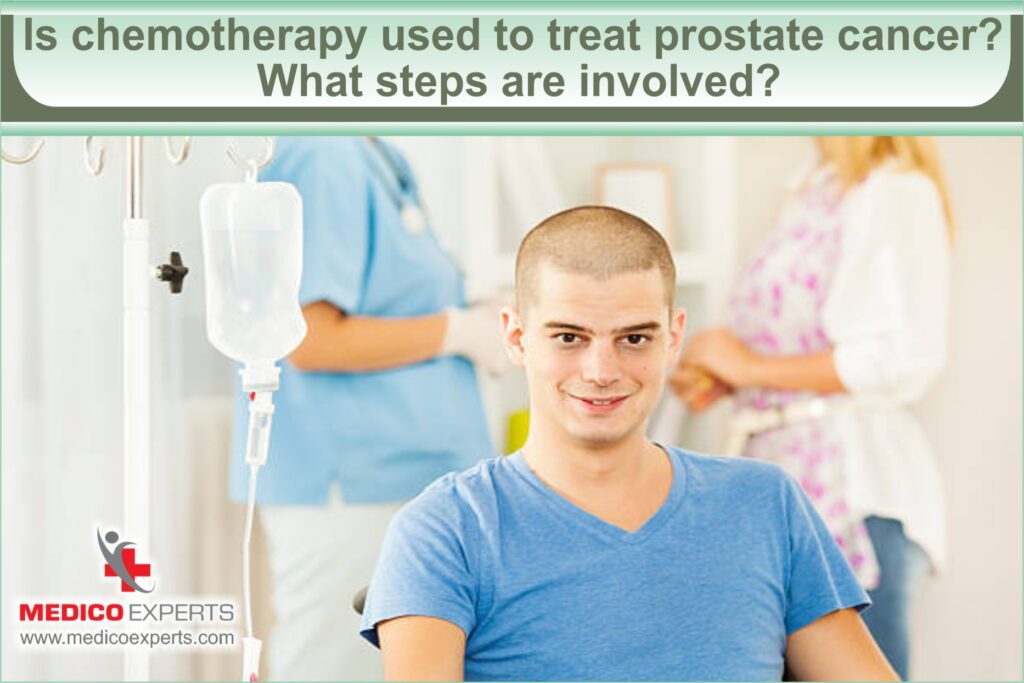
In the treatment of prostate cancer, chemotherapy involves the administration of medications that are designed to specifically target and eliminate cancer cells.
Here’s a breakdown of the process:
Drug Administration:
Chemotherapy drugs are given to the patient through an IV, orally, or via injections.
The method of administration depends on the specific drugs prescribed and the patient’s overall health.
Treatment Schedule:
Chemotherapy sessions are scheduled over several weeks, with breaks in between.
The frequency and duration of treatment are determined based on the type and stage of prostate cancer.
Combination Therapy:
Chemotherapy may be used in combination with other treatments such as hormone therapy or radiation therapy.
This multidisciplinary approach aims to enhance the effectiveness of the treatment plan.
Personalized Treatment Plans:
Decision-making regarding chemotherapy is collaborative between the patient and their healthcare team.
Factors such as the stage of cancer, state of health, and individual preferences play a crucial role in crafting a personalized treatment strategy.
Before starting chemotherapy, what preparations are necessary?
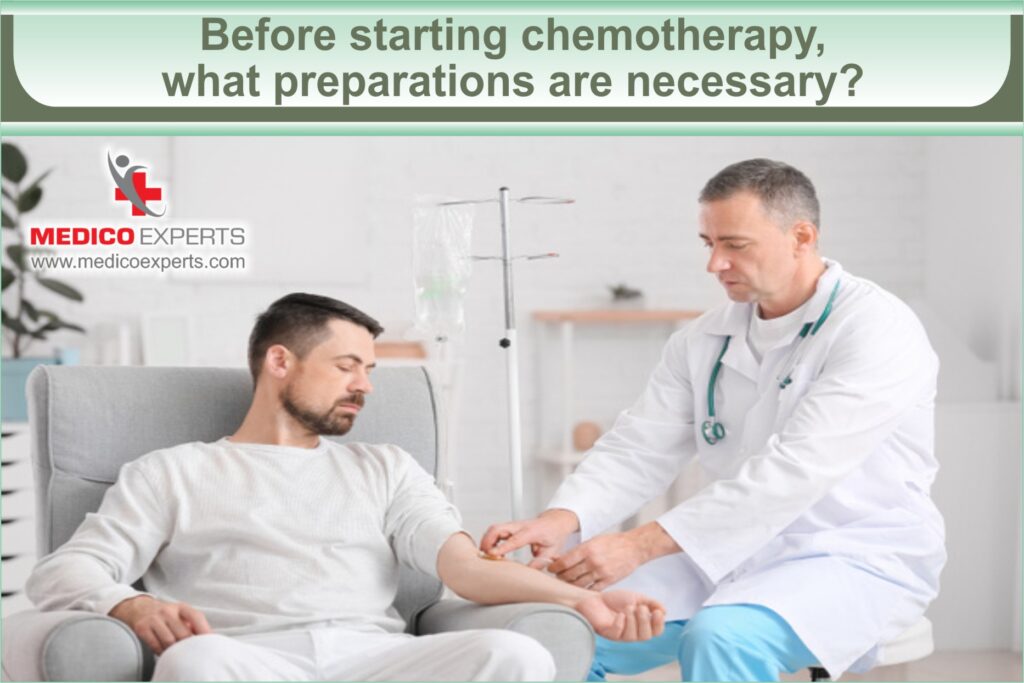
Before beginning chemotherapy, it’s essential to undergo blood tests to ensure that starting the treatment is safe.
Typically, these tests are conducted either the day before or on the day treatment commences. Additionally, before each round or cycle of chemotherapy, blood tests are routinely performed.
Your healthcare team, including doctors and pharmacists, calculates your chemotherapy dose by considering factors such as your blood cell levels, weight, height, and complete health.
This tailored approach ensures that the treatment is custom-made to your specific needs and minimizes potential risks.
How is chemotherapy given for prostate cancer?
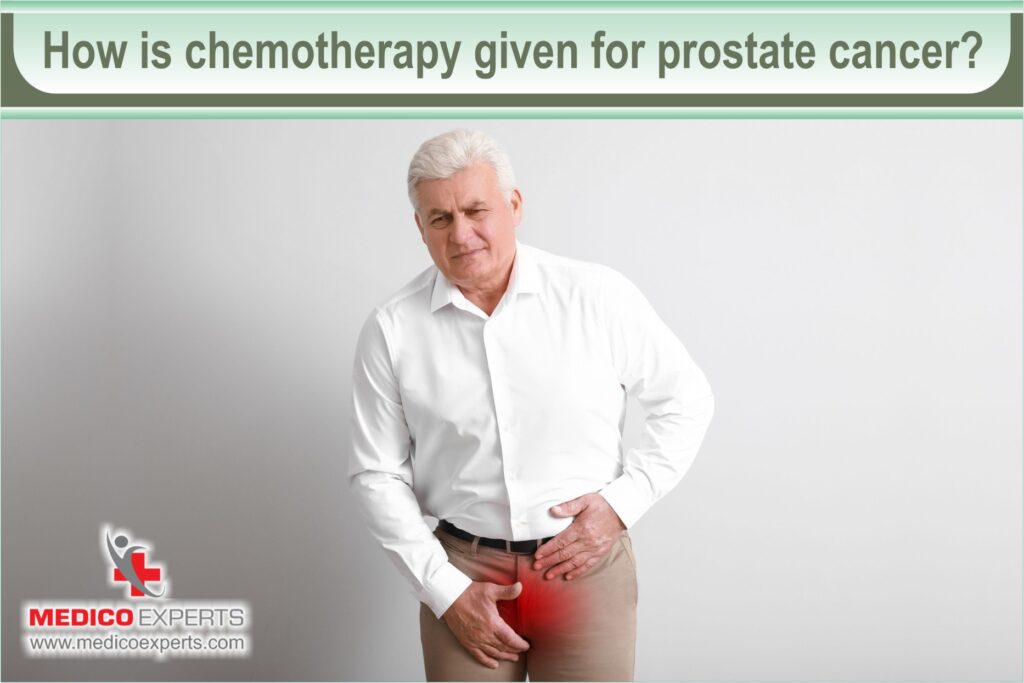
Chemotherapy for prostate cancer is usually given through a vein, known as an IV, either in a doctor’s office, chemotherapy clinic, or a hospital. Some drugs, like estramustine, come in pill form.
A special type of IV called a central venous catheter (CVC) may be used to administer chemo. These are slightly larger and sturdier and can also be used to draw blood for testing.
Chemo is given in cycles, with each treatment period followed by a rest period for recovery. These cycles typically last 2 or 3 weeks, depending on the drugs used. The schedule can vary, with some drugs given only on the first day, while others may be given for a few days in a row or once a week.
The treatment plan is adjusted based on how well it works and any side effects experienced.
The length of chemotherapy for advanced prostate cancer depends on its effectiveness and the individual’s response to the treatment.
What are the potential side effects of Chemotherapy for prostate cancer?
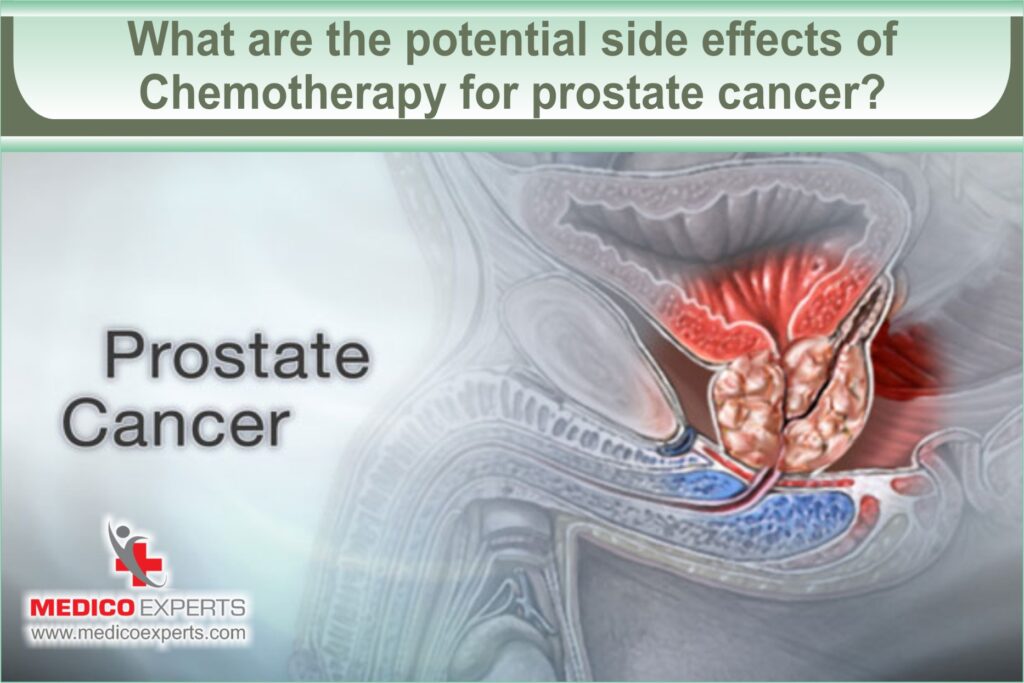
Chemotherapy for prostate cancer, while effective in targeting cancer cells, can result in several potential side effects.
Here’s an overview followed by specific pointers:
Chemotherapy impacts both cancerous and healthy cells, leading to various side effects. The severity and duration of these effects can vary among individuals.
Here are Common Side Effects:
Nausea and Vomiting:
Chemotherapy can cause nausea, and in some cases, vomiting.
Anti-nausea medications are often prescribed to manage these symptoms.
Fatigue:
Increased fatigue is a common side effect during chemotherapy.
Adequate rest and maintaining a balanced lifestyle can help alleviate fatigue.
Hair Loss:
Hair loss, including scalp and body hair, is a possible side effect.
The extent of hair loss varies, and not all chemotherapy drugs cause it.
Changes in Blood Cell Counts:
Chemotherapy may impact the production of blood cells, leading to an increased risk of infection, anemia, and bleeding tendencies.
Appetite Changes:
Changes in taste and appetite are common.
Maintaining proper nutrition is important, and dietary adjustments may be necessary.
Mood Swings:
Some patients may experience mood swings or changes in emotional well-being.
Seeking support from friends, family, or counseling services can be beneficial.
Peripheral Neuropathy:
Tingling, numbness, or pain in the hands and feet (neuropathy) can occur.
Close monitoring and adjustments to the treatment plan can help manage neuropathy.
Digestive System Issues:
Diarrhea or constipation may occur due to the impact on the digestive system.
Adequate hydration and dietary adjustments can help manage these symptoms.
Increased Risk of Bruising and Bleeding:
Changes in blood clotting factors may result in an increased risk of bruising and bleeding.
Patients are advised to report any unusual bleeding or bruising promptly.
One of the most important things that people who are taking chemotherapy for prostate cancer should do is speak honestly with their healthcare staff about any side effects that they feel. This will allow for prompt intervention, which will ultimately lead to an improvement in their health.
What is the success rate of chemotherapy for prostate cancer?
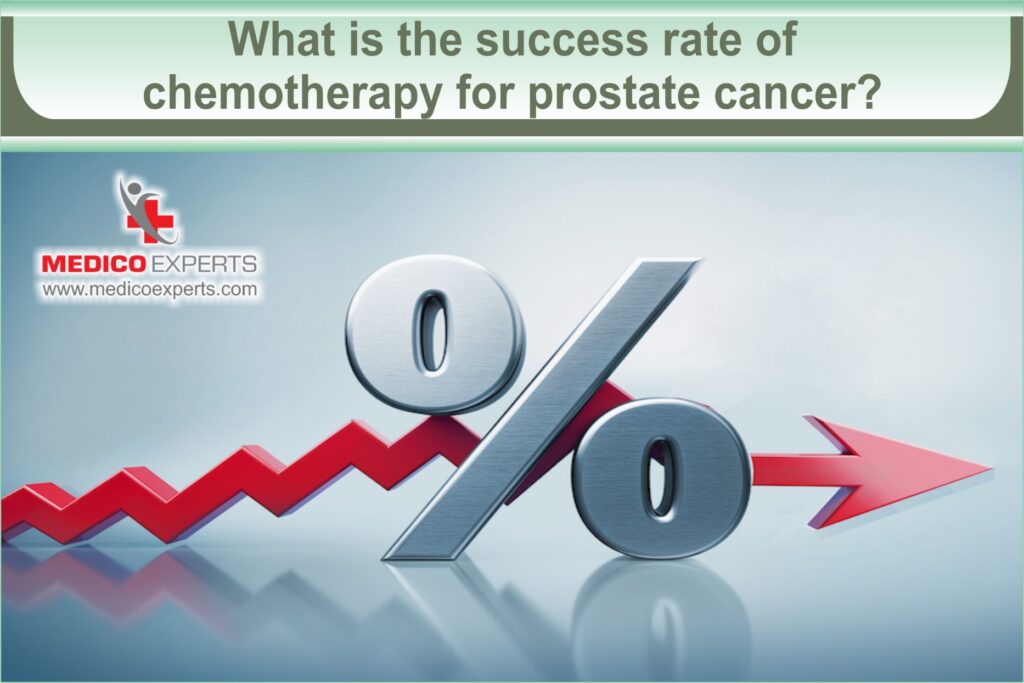
The success rate of chemotherapy for prostate cancer can vary depending on several factors, including the stage of cancer, the health of the patient, and how well the cancer responds to the treatment.
It’s important to note that chemotherapy is often not the first-line treatment for prostate cancer; it is typically considered when the cancer has spread beyond the prostate gland or when other treatments have not been effective.
For advanced prostate cancer, chemotherapy can be effective in managing symptoms, slowing down the progression of the disease, and potentially extending life.
Conclusion
Remember knowledge is your greatest asset. Chemotherapy is like a strong weapon against prostate cancer, especially when the disease has spread beyond its initial location.
MedicoExpert’s Tumor Board is your reliable companion on this journey, providing insights and support every step of the way.
If you’re seeking answers or a sense of community, look no further. MedicoExpert’s Tumor Board is here to offer guidance and understanding.
Let’s continue the conversation!
Share your views and experiences in the comments below. Your insights may inspire and support others on a similar path. Take that step—and book an appointment today!
FAQ :
Q1. Is chemotherapy the first treatment option for prostate cancer?
A. No, chemotherapy is typically not the first choice. It’s considered when other treatments like surgery or hormone therapy aren’t as effective, especially if the cancer has spread.
Q2. Can I work or carry on with daily activities during prostate cancer chemotherapy?
A. It varies. Some people can continue with daily activities, while others may need to rest more. You will be guided based on your situation by your healthcare team.
Q3. Do all prostate cancer patients experience hair loss during chemotherapy?
A. Chemotherapy drugs don’t all lead to hair loss. It depends on the specific drugs used in the treatment.
Q4. What happens if I miss a session of chemotherapy?
A. Missing a session can affect the effectiveness of treatment. It’s essential to follow the recommended schedule. Additionally, MedicoExpert’s Tumor Board is here to assist you. You can reach out to our experts for guidance and support in navigating any challenges or uncertainties related to your prostate cancer treatment.
Q5. Can chemotherapy cure prostate cancer completely?
A. In some cases, chemotherapy can help control the cancer and improve symptoms, but it may not always lead to a complete cure.



